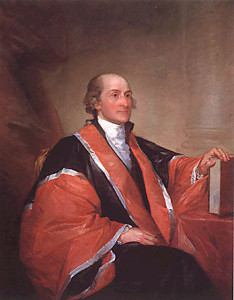 How about a little wisdom from one of America’s Founders today? Most people are not too familiar with John Jay, but he was central to almost every major event of the Founding. Jay served in the Continental Congress, was one of the principal leaders in the debates leading to Independence, was elected president of Congress at one point, and was appointed one of the peace commissioners who negotiated the end of the American Revolution.
How about a little wisdom from one of America’s Founders today? Most people are not too familiar with John Jay, but he was central to almost every major event of the Founding. Jay served in the Continental Congress, was one of the principal leaders in the debates leading to Independence, was elected president of Congress at one point, and was appointed one of the peace commissioners who negotiated the end of the American Revolution.
Afterwards, he, along with James Madison and Alexander Hamilton, authored some of the Federalist Papers, which today are still the best source for knowing how the Founders understood the nation’s new Constitution. Then, after Washington was inaugurated, he was chosen to be the first Chief Justice of the United States Supreme Court.
Later, Jay resigned from that position because he was elected governor of New York. As governor, he saw the fulfillment of one of his lifelong goals: he signed a law leading to the eventual abolition of slavery in that state.
When Jay finally retired from public service, he became president of the American Bible Society. His Christian faith was the bedrock of his life. This is seen in a number of his writings. For instance, in a letter to Rev. Jedidiah Morse, he opined,
Providence has given to our people the choice of their rulers, and it is the duty, as well as the privilege and interest of our Christian nation to select and prefer Christians for their rulers.
Notice he considered America to be founded as a Christian nation—not artificially by legislative fiat, but as a matter of choice. The only way a nation can be truly Christian is if the people voluntarily consider Christianity to be the framework for their thinking, their culture, and their laws.
In that same letter to Morse, he commented on the Bible and how it fits into history:
It is to be regretted, but so I believe the fact to be, that except the Bible there is not a true history in the world. Whatever may be the virtue, discernment, and industry of the writers, I am persuaded that truth and error (though in different degrees) will imperceptibly become and remain mixed and blended until they shall be separated forever by the great and last refining fire.
As a historian, I can vouch for that. All histories are a mixture of truth and error, no matter how conscientious we may be. God’s Word, though, can be relied on as absolute truth.
Finally, here is Jay’s perception of the validity of Christianity:
I have long been of opinion that the evidence of the truth of Christianity requires only to be carefully examined to produce conviction in candid minds.
In other words, a clearheaded examination of the claims of the Christian faith should lead anyone with an open heart to the conclusion that it, and only it, is the true explanation of the condition of mankind, the nature of God, and the way to salvation.
Wouldn’t it be wonderful if a majority of our elected leaders had the same views and character as John Jay? Well, that’s up to us. As Jay said, it is the duty, the privilege, and the interest of the voters to select Christians for their leaders. If we don’t have those kinds of leaders, the fault lies with us.
